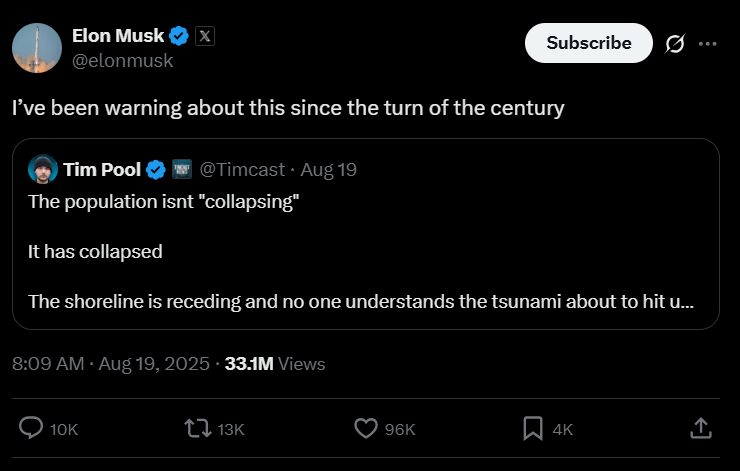Elon Musk’s population decline concerns have once again taken center stage after he warned that Japan, a country of 124 million people, could see its numbers fall by nearly one million this year.
Musk has been one of the loudest voices raising awareness about falling birth rates and the risks tied to them. For years, he has described population decline as a major threat, stressing that it could grow into the biggest problem humanity will face in the next two decades.
The population isnt “collapsing”
It has collapsed
The shoreline is receding and no one understands the tsunami about to hit us
As US population goes it will be impossible to redevelop. Automation won’t replace your customers
— Tim Pool (@Timcast) August 19, 2025
Back in 2022, Musk used his social media platform X, which was formerly known as Twitter, to share an alarming thought. His post at the time read that population collapse due to low birth rates was a much bigger risk to civilization than global warming, asking people to remember his words. That message reflected his growing concern that shrinking populations could bring challenges to economies, families, and societies worldwide.
By August 19 of this year, Musk showed that those concerns had not eased. He returned to X and reshared a post from another user, which stated bluntly that the population is not collapsing; it has already collapsed. To Musk, this was not just a possibility but something unfolding in real time. He also amplified the post with another dramatic warning, saying the shoreline is receding and no one understands the tsunami that is about to strike.
He explained that if the United States population followed a similar path, rebuilding would be impossible. Automation would not replace the absence of people, he argued, since machines cannot fill the role of customers who drive demand. Adding his own note to the reshared comments, Musk remarked that he had been sounding this alarm since the start of the century. His voice was firm, showing that his stance had not wavered over time.
Japan was his latest focus. He noted that the country may experience a population drop of nearly one million people before the end of this year alone. This warning sparked fresh discussions online and added new weight to long-standing concerns about Japan’s demographic future.
The reactions to Musk’s claims varied widely. Some people expressed anger, pointing out that billionaires often hold on to extreme amounts of wealth. One user wrote that if billionaires were not hoarding all of the resources, families might feel more comfortable raising children. Others shifted the discussion toward women’s rights, stating that low birth rates can be understood when women are viewed as full human beings. One commenter explained that women have ambitions, dreams, hopes, and fears. They want to live full lives and should not be reduced to a single role. The comment added that if society wants more children, it should make sure women can pursue motherhood without giving up all of their other goals.

Another user took a practical view, suggesting that governments should incentivize parenthood. The comment stressed that young generations today are waiting longer to marry, with some avoiding it altogether, while facing enormous financial pressures. The cost of healthcare, the price of housing, and stagnant wages make raising children difficult. Balancing those costs with building a family has become a struggle, which could explain why many hesitate to have children at all.
Alongside the debate, some noted that Musk himself appears to be taking personal action on the issue. He has fathered 14 children with four different women. This detail added another layer to the discussion, showing that Musk may be living out his words in his own life.
Reports from the Wall Street Journal revealed leaked text messages between Musk and Ashley St Clair, a political influencer linked to him through one of his children. In those texts, Musk wrote that to reach legion level before what he called the apocalypse, surrogates would need to be used. This unusual choice of words sparked attention. For context, a legion in Ancient Rome referred to a unit of about 5,000 soldiers. Musk’s use of the term reflected his grand and dramatic way of framing the issue, hinting that he saw family growth as part of a larger mission.
Musk’s repeated focus on population decline shows that he views the issue as central to the future of civilization.
He has described it as a bigger threat than climate change and sees it as a looming crisis that is already showing signs in countries like Japan. His critics argue that wealth inequality, social structures, and economic hardships must be addressed before people can realistically be expected to have larger families. Supporters, on the other hand, feel that he is one of the few public figures highlighting a problem that could reshape societies if ignored.
The conversation sparked by Musk’s warning continues to raise questions about how nations should respond. If populations keep shrinking at this rate, countries could face challenges in workforce numbers, economic growth, and social care systems. Musk’s words, sharp and urgent, keep drawing attention to a debate that is far from over.
